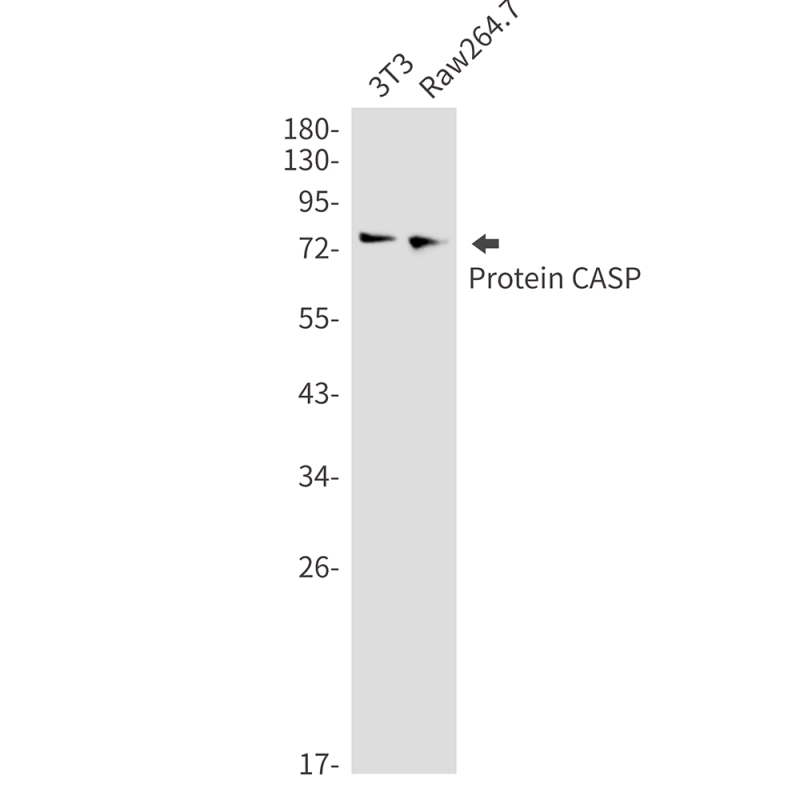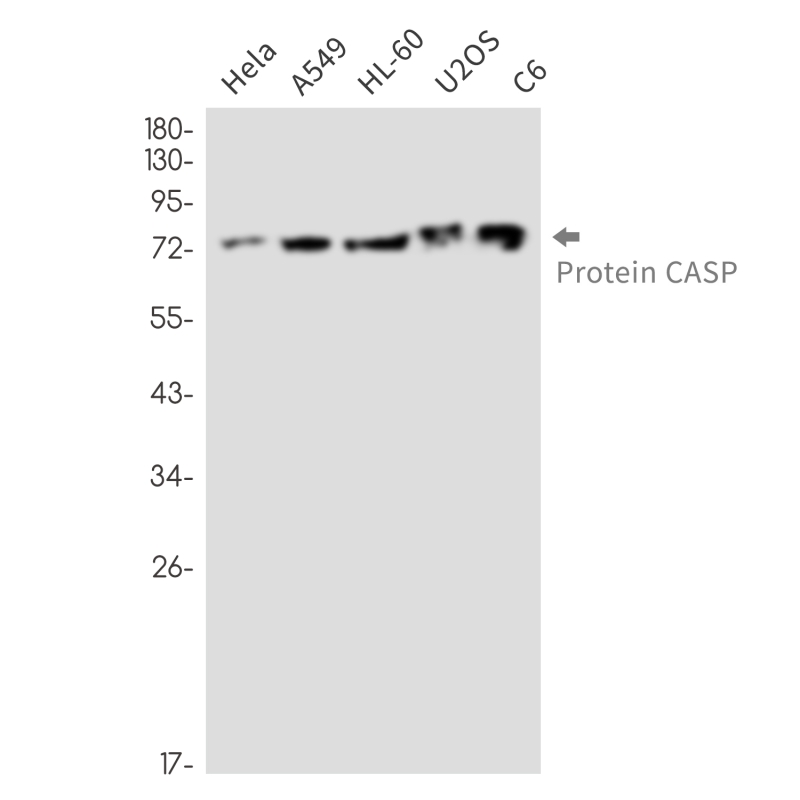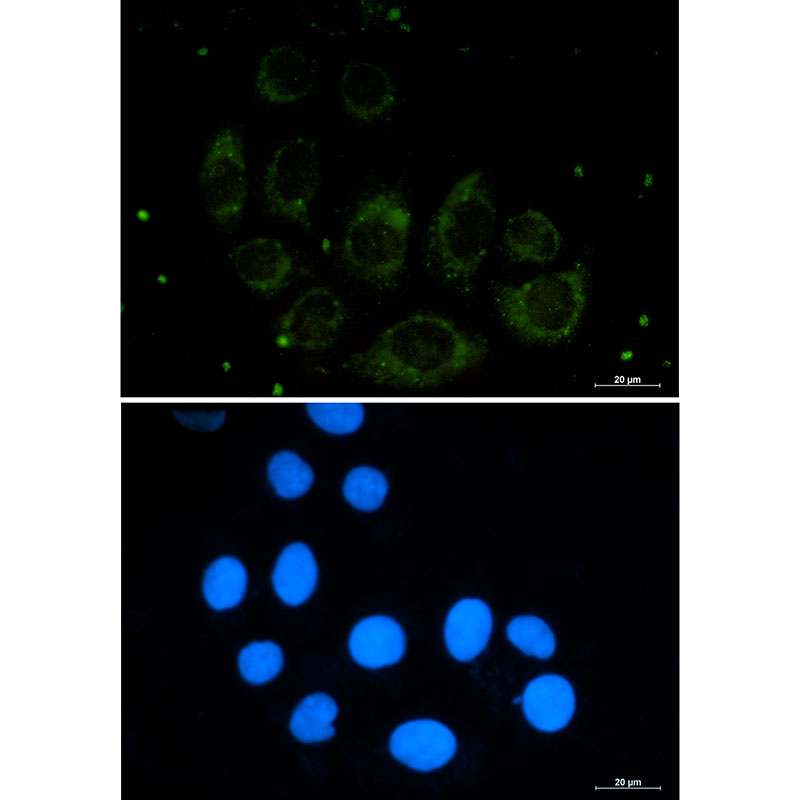


| WB | 1/500-1/1000 | Human,Mouse,Rat |
| IF | 1/20 | Human,Mouse,Rat |
| IHC | 咨询技术 | Human,Mouse,Rat |
| ICC | 1/50-1/200 | Human,Mouse,Rat |
| FCM | 咨询技术 | Human,Mouse,Rat |
| Elisa | 咨询技术 | Human,Mouse,Rat |
| Aliases | CDP; CUX; p75; CASP; CDP1; COY1; Clox; GDDI; p100; p110; p200; CUTL1; GOLIM6; CDP/Cut; Cux/CDP; Nbla10317 |
| Entrez GeneID | 1523 |
| WB Predicted band size | Calculated MW: 77 kDa; Observed MW: 77 kDa |
| Host/Isotype | Rabbit IgG |
| Antibody Type | Primary antibody |
| Storage | Store at 4°C short term. Aliquot and store at -20°C long term. Avoid freeze/thaw cycles. |
| Species Reactivity | Human,Mouse,Rat |
| Immunogen | Recombinant protein of human Protein CASP |
| Formulation | Purified antibody in TBS with 0.05% sodium azide,0.05%BSA and 50% glycerol. |
+ +
以下是3篇与Caspase(CASP)抗体相关的参考文献,按研究重点分类整理:
---
1. **文献名称**: *Monoclonal antibody-mediated specific immunodepletion of caspase-3 in cell extracts*
**作者**: Talanian RV 等
**摘要**: 该研究开发了针对Caspase-3的单克隆抗体,利用其特异性免疫沉淀能力验证Caspase-3在细胞凋亡中的核心作用,并证明该抗体在体外实验中有效抑制酶活性(*Biochemistry*, 2002)。
2. **文献名称**: *A caspase-3 antibody for immunohistochemical detection of apoptosis in animal tissues*
**作者**: Duan WR 等
**摘要**: 文章报道了一种高灵敏度的Caspase-3抗体,通过免疫组化技术检测动物组织中的凋亡细胞,验证了其在癌症模型中的诊断应用潜力(*J Histotechnol*, 2003)。
3. **文献名称**: *Targeted caspase cleavage of anti-apoptotic proteins in cancer therapy*
**作者**: Fischer U 等
**摘要**: 研究利用特异性Caspase抗体筛选小分子药物,发现其可诱导癌细胞中促凋亡蛋白的活化,为靶向治疗提供新策略(*Oncogene*, 2003)。
---
**说明**:
- 以上文献均围绕Caspase抗体的开发或应用,覆盖基础研究(酶活性验证)到临床诊断(免疫组化)和药物开发。
- 若需更近期文献,可补充关键词如“Caspase antibody therapeutic application”或“novel anti-Caspase nanobody”检索2020年后研究。
CASP (Cysteinyl Aspartate-Specific Protease) antibodies are tools designed to target caspases, a family of cysteine proteases critical for apoptosis (programmed cell death) and inflammation. Caspases are broadly categorized into initiators (e.g., caspase-8. -9), which activate downstream effector caspases (e.g., caspase-3. -7), and inflammatory caspases (e.g., caspase-1. -4). These enzymes regulate cell death pathways and cytokine maturation, linking them to diseases like cancer, neurodegeneration, and autoimmune disorders.
CASP antibodies are widely used in research to detect caspase expression, cleavage, or activation via techniques like Western blot, immunohistochemistry, and flow cytometry. For example, antibodies against cleaved caspase-3 help identify apoptotic cells in tissue samples. They also aid in studying drug mechanisms, as many therapies induce apoptosis by modulating caspase activity. Commercially available CASP antibodies are often validated for specificity, with some targeting inactive pro-forms or active fragments. Challenges include cross-reactivity due to structural similarities among caspases and ensuring proper validation in experimental models.
Overall, these antibodies are indispensable for dissecting apoptotic pathways, screening therapeutic agents, and understanding disease pathogenesis, making them vital in both basic and translational biomedical research.
×